Voice analytics, or speech analytics call center solutions, is a cutting-edge technology used in call center speech analytics software to transcribe and analyze spoken language. By converting customer interactions into structured data, voice analytics software enables businesses to unlock actionable insights that enhance agent performance, increase customer satisfaction, and optimize overall operations.
In the competitive call center industry, leveraging speech analytics call center solutions can significantly enhance customer interactions and deliver exceptional service. Here, we explore 20 powerful speech analytics use cases that can revolutionize your call center operations in 2025.
Boost Success with Speech Analytics Call Center Software
What is Speech Analytics?
In today’s fast-paced customer service landscape, voice analytics software has become indispensable for call centers. The ability to analyze every customer interaction enables call center speech analytics teams to gather a wealth of information, enhancing agent performance, improving customer satisfaction, and streamlining operations.
Speech analytics involves converting spoken language into text that can be analyzed for customer behavior, sentiment, and preferences. Call centers can make data-driven decisions that increase operational efficiency and customer experience by utilizing contact center speech analytics.
How Speech Analytics Software Works
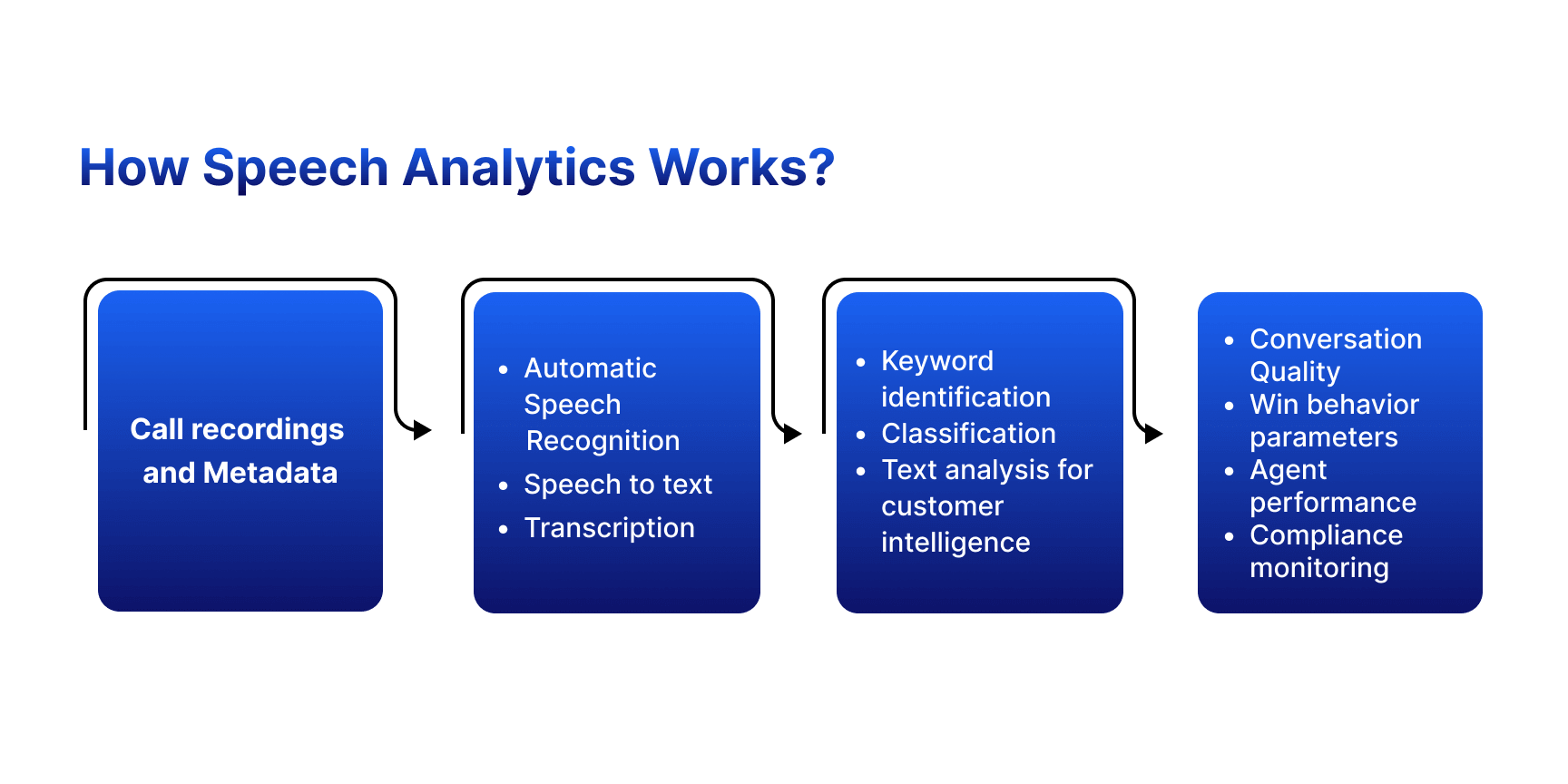
Speech analytics software uses advanced algorithms and artificial intelligence (AI) to process and analyze large volumes of voice data. The primary steps involved in this process include:
1. Recording and Transcription: Calls are recorded and transcribed into text using voice analytics technology. This transcription forms the basis for further analysis.
2. Speech-to-Text Conversion: Advanced speech analytics software converts spoken words into text, enabling the system to apply text analytics methods to extract meaningful information.
.webp)
3. Keyword and Phrase Detection: The software identifies keywords and phrases indicating important topics, customer sentiment, or compliance issues.
4. Voice-based Sentiment Analysis: The software evaluates the speaker's tone and emotion through voice-based sentiment analysis, helping to gauge customer satisfaction and agent performance.
5. Pattern Recognition and AI: The software uses speech analytics AI to detect patterns in customer interactions, such as frequent complaints or common issues and provides actionable insights.
Benefits of Speech Analytics Software
Call centers can unlock valuable insights that drive continuous improvement and customer satisfaction by integrating speech analytics into their operations.
- Improved Customer Experience: By understanding customer sentiment and behavior, call centers can tailor their approach to meet customer needs more effectively.
- Enhanced Agent Performance: Contact center speech analytics provides agents with real-time feedback and coaching, leading to better performance and higher satisfaction rates.
- Operational Efficiency: Automated analysis reduces the need for manual call reviews, saving time and resources while increasing accuracy.
- Compliance and Risk Management: Speech analytics examples show how this technology can ensure compliance with regulations by monitoring and flagging non-compliant interactions.
This blog is just the start.
Unlock the power of Convin’s AI with a live demo.

Top 20 Speech Analytics Call Center Software Use Cases
Here are 20 speech analytics call center software use cases demonstrating how call center speech analytics software can transform your operations, enhance customer satisfaction, and boost performance:
Use Case 1: Enhancing Customer Satisfaction
- Voice-based Sentiment Analysis
Voice-based sentiment analysis uses voice analytics to gauge the emotions and tone of customer conversations. By analyzing the sentiment behind customer interactions, call centers can identify dissatisfied customers and take proactive measures to resolve issues. This real-time feedback helps in improving the overall customer experience.
- Real-time Feedback Mechanisms

Using contact center speech analytics, managers can monitor conversations and offer guidance to agents, ensuring that customer queries are handled efficiently and effectively.
Use Case 2: Improving Agent Performance
- Personalized Agent Coaching
Speech analytics software analyzes agents' interactions to identify areas for improvement. Based on these insights, personalized coaching sessions can be designed to help agents refine their skills and improve their performance. This leads to better customer service and higher satisfaction rates.
- Performance Monitoring
Voice analytics enables continuous performance monitoring of agents. By tracking key performance indicators (KPIs) and utilizing speech analytics AI, call centers can ensure that agents meet their targets and deliver high-quality service.
Use Case 3: Compliance and Quality Assurance
- Automated Quality Management
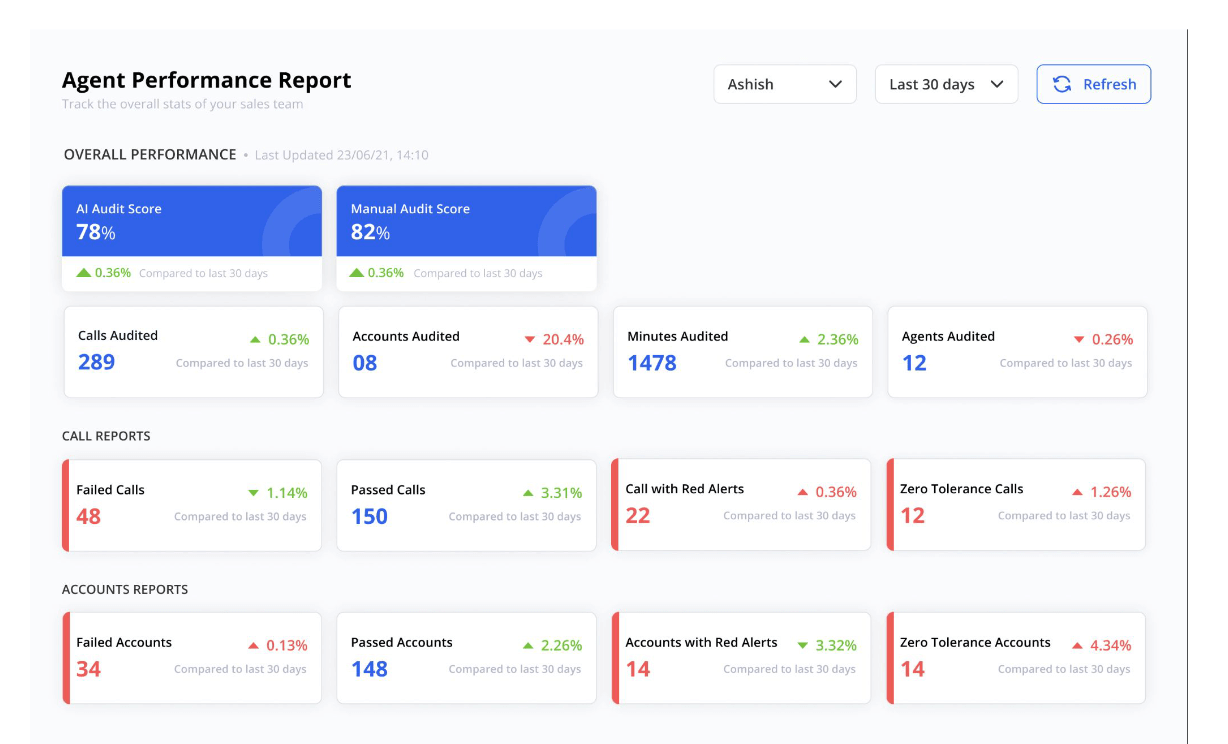
Automated quality management uses speech analytics to review 100% of customer interactions. This ensures that all calls comply with regulatory standards and internal policies. Call centers can save time and reduce human error by automating the quality assurance process.
- Ensuring Compliance Standards
Voice analytics helps ensure compliance by monitoring interactions to ensure adherence to scripts and protocols. This is crucial in industries with strict regulatory requirements, where maintaining compliance can prevent costly fines and reputational damage.
Use Case 4: Reducing Average Handle Time (AHT)
- Efficient Call Routing
Efficient call routing, powered by speech analytics call center solutions, directs calls to the most suitable agent based on analyzing the customer's needs and the agent's skills. This reduces the average handle time and improves customer satisfaction.
- Real-time Assistance
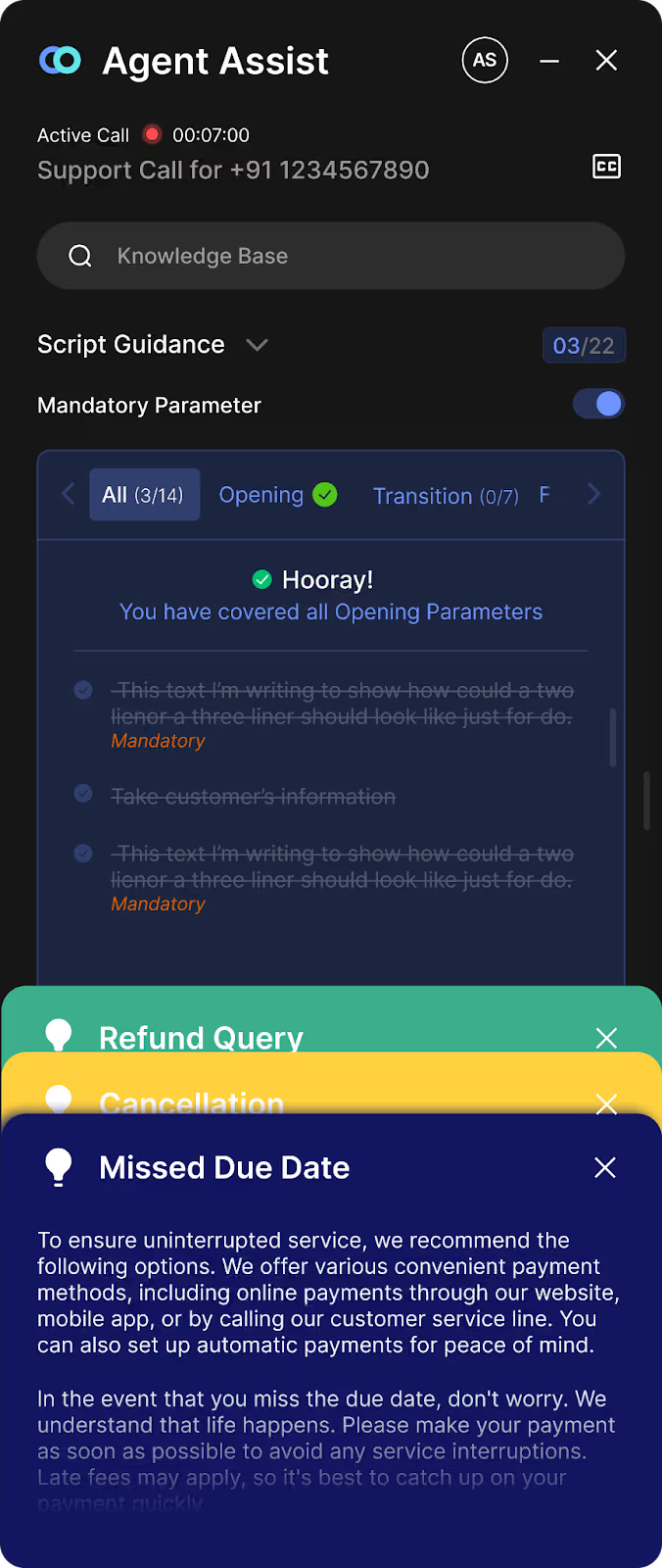
Real-time assistance tools provide agents with immediate suggestions and prompts during calls. Using contact center speech analytics, these tools can identify the best course of action, helping agents resolve issues faster and more effectively.
Use Case 5: Boosting Sales and Conversion Rates
- Identifying Upsell Opportunities
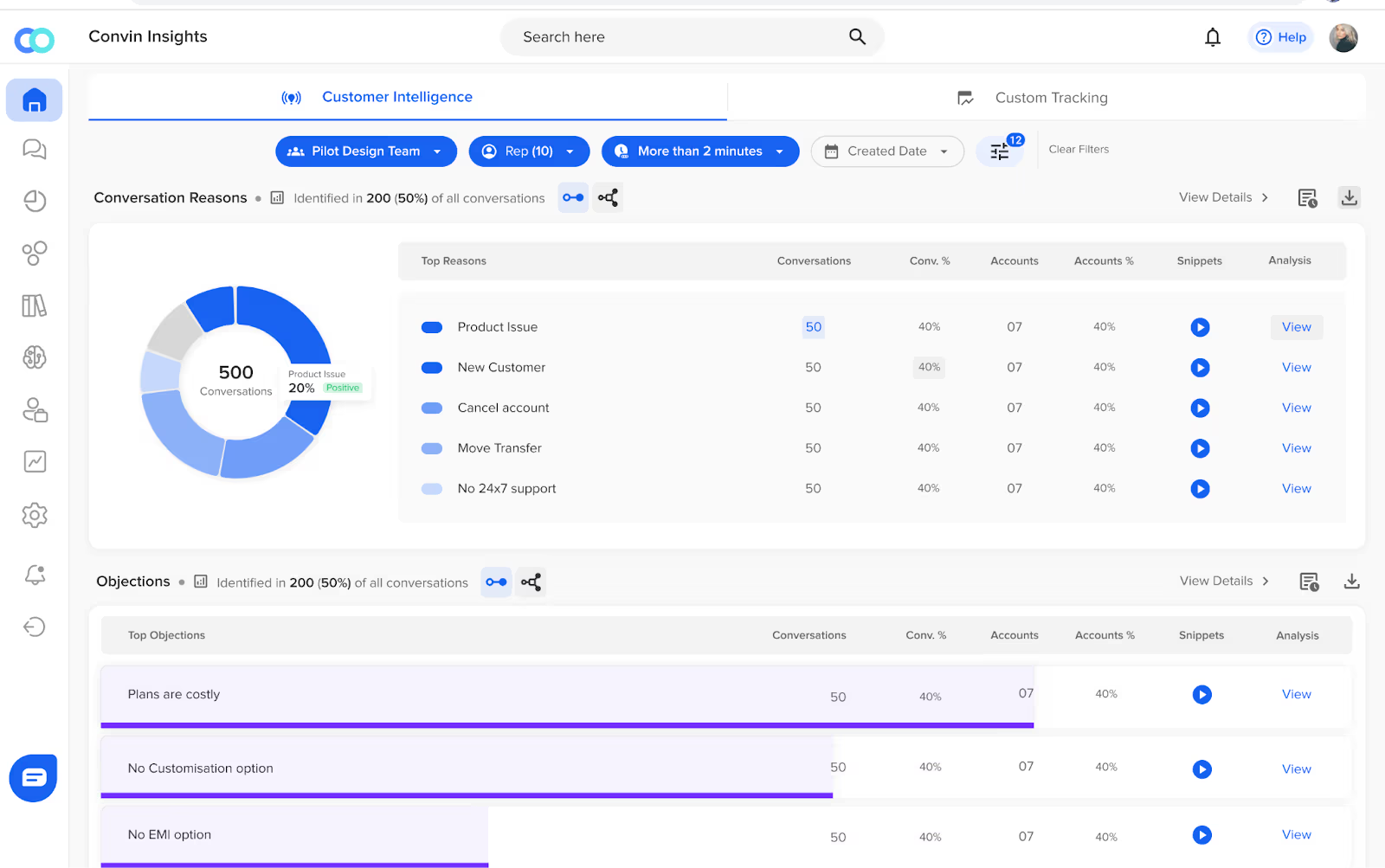
Voice analytics can analyze customer conversations to identify potential upsell opportunities. By recognizing cues and patterns indicative of buying intent, agents can be guided to offer relevant products or services, increasing sales and conversion rates.
- Call Scoring and Insights
Speech analytics software scores call based on predefined criteria, providing insights into agent performance and customer interactions. This helps identify successful sales techniques and areas for improvement, ultimately boosting conversion rates.
Use Case 6: Enhancing First Call Resolution (FCR)
- Proactive Issue Resolution
Proactive issue resolution involves using voice analytics to identify and address potential problems before they escalate. Call centers can improve their first-call resolution rates by analyzing previous interactions and predicting future issues.
- Root Cause Analysis
Root cause analysis helps understand the underlying reasons for customer issues. Speech analytics examples show how this technology can pinpoint the root causes, enabling call centers to implement effective solutions and improve FCR.
Use Case 7: Reducing Churn Rates
- Predictive Analytics
Predictive analytics uses voice analytics to forecast customer behavior and identify those at risk of churning. By proactively addressing customers' concerns, call centers can improve customer retention and reduce churn rates.
- Customer Retention Strategies
Implementing customer retention strategies based on insights from speech analytics AI can significantly improve customer loyalty. These strategies include personalized offers, timely follow-ups, and addressing specific pain points identified through voice analytics.
Use Case 8: Workforce Optimization
- Predictive Scheduling
Predictive scheduling leverages contact center speech analytics to forecast call volumes and optimize staffing levels. This ensures that the right number of agents are available at peak times, improving efficiency and customer service.
- Workload Management
Workload management tools powered by speech analytics software help distribute tasks evenly among agents. By analyzing call data and performance metrics, these tools ensure that workloads are balanced, reducing agent burnout and improving productivity.
Use Case 9: Training and Development
- Onboarding New Agents
Onboarding new agents becomes more effective with voice analytics. By analyzing top-performing agents' calls, training programs can be developed to teach best practices and ensure new agents are well-prepared to handle customer interactions.
- Continuous Learning Programs
Speech analytics support continuous learning programs, which ensure that agents keep improving their skills. Regular feedback and training sessions based on voice analytics insights help agents stay updated with the latest techniques and knowledge.
Use Case 10: Enhancing Customer Experience (CX)
Personalized Customer Interactions
With insights from voice-based sentiment analysis, personalized customer interactions are possible. By understanding customer preferences and behavior, agents can tailor their responses and offers, leading to a better customer experience.
- Customer Journey Mapping
Customer journey mapping involves tracking and analyzing customer interactions across multiple touchpoints. Call centers can use speech analytics examples to identify key moments in the customer journey and optimize them for a seamless experience.
Maximize Call Center Efficiency: Implement Voice Analytics with Convin!
Use Case 11: Identifying Customer Pain Points
- Sentiment Analysis
Sentiment analysis helps identify customer pain points by analyzing their emotions and tone during interactions, allowing call centers to address issues proactively and improve overall customer satisfaction.
- Text Analytics
Text analytics complements voice analytics by analyzing written customer feedback from emails, chats, and social media. This provides a comprehensive view of customer issues and helps devise effective solutions.
Use Case 12: Fraud Detection and Prevention
- Anomalies in Call Patterns
Fraud detection involves identifying anomalies in call patterns using speech analytics AI. Call centers can detect and prevent fraudulent activities in real-time by monitoring unusual activities or behaviors.
- Security Protocols
Implementing security protocols based on insights from voice analytics helps safeguard sensitive customer information. These protocols ensure that interactions comply with data protection regulations and prevent breaches.
Use Case 13: Optimizing Marketing Strategies
- Campaign Effectiveness
Optimizing marketing strategies involves analyzing call data to measure campaign effectiveness. Speech analytics software provides insights into customer responses and preferences, helping marketers refine their strategy for better results.
- Customer Feedback Analysis
Customer feedback analysis uses voice and text analytics to gather insights from customer interactions. This helps businesses understand their needs and preferences, enabling them to tailor their marketing efforts accordingly.
Use Case 14: Enhancing Product Development
- Customer Insights

Enhancing product development involves using voice analytics to gather customer insights. By understanding customer needs and pain points, businesses can develop products that better meet their demands.
- Market Trends
Analyzing market trends with speech analytics helps businesses stay ahead of the competition. By monitoring customer interactions, companies can identify emerging trends and adjust their product development strategies accordingly.
Use Case 15: Improving Call Scripts
- Dynamic Script Adjustments
Improving call scripts involves making dynamic adjustments based on real-time insights from speech analytics. This ensures that agents have the most effective responses and can efficiently handle customer queries.
- Contextual Prompts
Contextual prompts, generated by contact center speech analytics, guide agents during calls. These prompts help maintain the conversation flow and ensure that key points are addressed.
Use Case 16: Increasing Operational Efficiency
- Process Automation
Increasing operational efficiency involves automating routine tasks using voice analytics. This reduces agents' workload and allows them to focus on more complex customer issues.
- Task Prioritization
Powered by speech analytics software, task prioritization ensures that agents address the most critical issues first. This improves efficiency and helps in resolving customer queries promptly.
Use Case 17: Enhancing Collaboration
- Cross-department Insights
Enhancing collaboration involves sharing insights from voice analytics across departments. This ensures everyone is aligned and can work together to improve customer service and operational efficiency.
- Unified Communication Strategies
Unified communication strategies, supported by contact center speech analytics, ensure that all departments communicate effectively. This leads to better coordination and a seamless customer experience.
Use Case 18: Leveraging AI for Advanced Analytics
- Speech Analytics AI
Leveraging AI for advanced analytics involves using speech analytics AI to gain deeper insights into customer interactions. This helps identify trends, predict outcomes, and make data-driven decisions.
- Predictive Modelling
Predictive modeling uses voice analytics to forecast future trends and behaviors. This enables call centers to prepare for challenges and opportunities, ensuring continuous improvement.
Use Case 19: Measuring Customer Sentiment
- Voice-based Sentiment Analysis
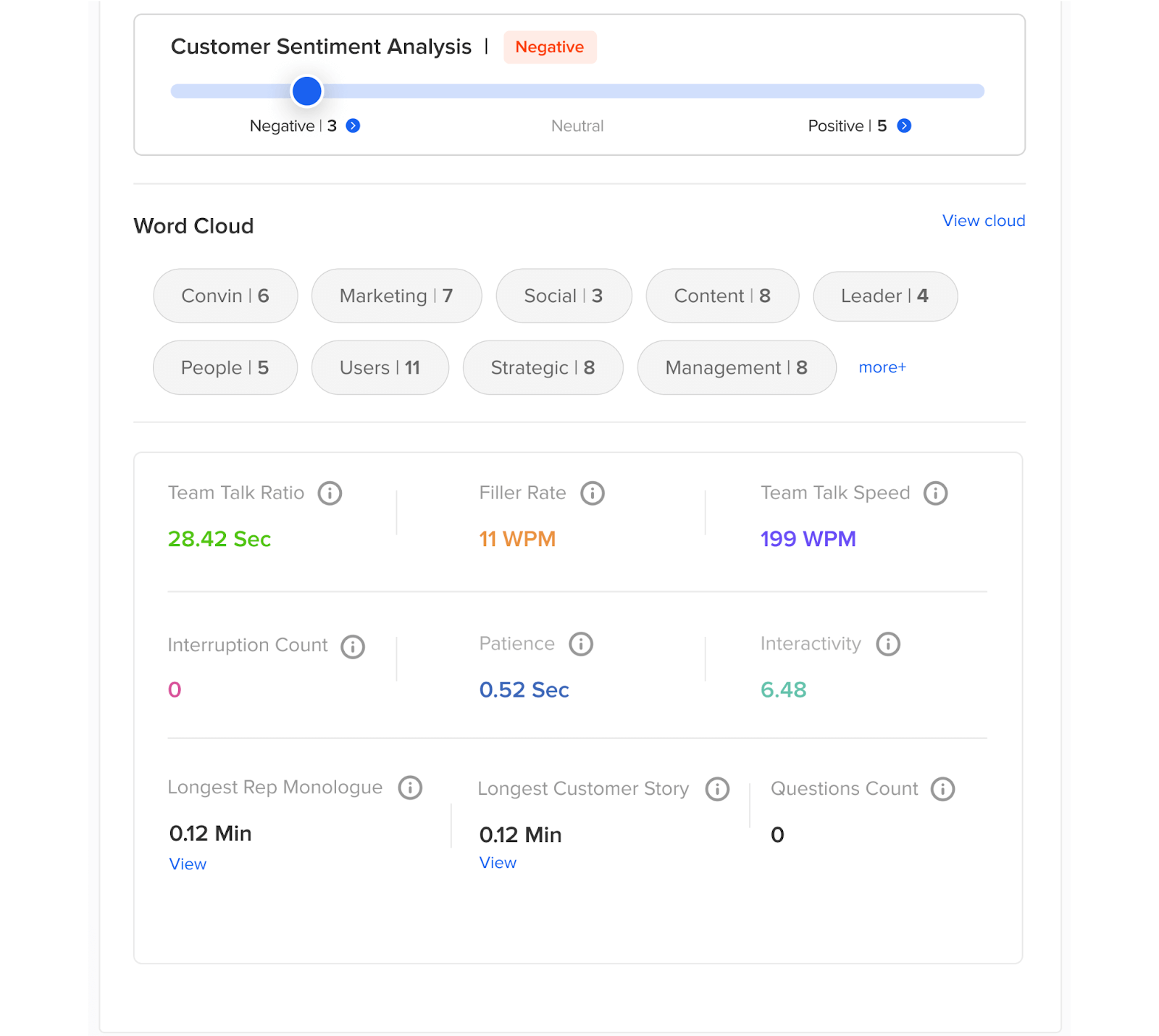
Measuring customer sentiment involves using voice-based sentiment analysis to understand customer emotions and reactions. This provides valuable feedback that can be used to enhance customer service.
- Customer Satisfaction Scores
Customer satisfaction scores, derived from speech analytics, provide a quantitative measure of customer happiness. These scores help track performance and identify areas for improvement.
Use Case 20: Future Trends in Voice Analytics
- Innovations in Speech Analytics
Future trends in voice analytics involve ongoing innovations in speech analytics technology. These advancements will continue to enhance call centers' capabilities, making them more efficient and effective.
Transforming Call Centers with Convin's Advanced Voice Analytics Solutions
Convin, with its advanced AI-backed contact center software, is uniquely positioned to revolutionize call centers through comprehensive voice analytics.
By recording, transcribing, and analyzing customer conversations, Convin offers real-time insights and automated coaching to improve agent performance, enhance customer satisfaction, and ensure compliance.
Its robust features, including personalized agent coaching, automated quality management, and real-time sentiment analysis, empower call centers to optimize their operations and significantly improve sales, customer retention, and overall efficiency.
With Convin, businesses can leverage cutting-edge technology to stay ahead in the competitive customer service landscape.
Maximize Call Center Efficiency: Implement Speech Analytics with Convin!
Leverage Convin’s advanced speech analytics software to enhance your call center’s operations. With real-time insights, automated coaching, and sentiment analysis, Convin helps call centers improve agent performance, boost sales, ensure compliance, and elevate customer satisfaction.
Stay ahead of the competition and optimize your call center with Convin’s speech analytics software today!
The Future of Call Centers: How Speech Analytics is Revolutionizing Customer Service
Integrating speech analytics software in call centers is transforming the customer service landscape. Call centers can gain valuable insights that improve agent performance and customer experience by analyzing every customer interaction.
The future of contact center speech analytics lies in further integrating AI with voice analytics, offering more advanced real-time analytics and even greater accuracy in sentiment and emotion detection. As these technologies evolve, call centers can provide even more personalized, efficient, and compliant services, ensuring long-term success in the competitive world of customer service.
Transform Your Call Center with Convin’s Cutting-Edge Voice Analytics Solutions Today!
Experience Convin's Innovative Speech Analytics Call Center Software
FAQs
- How do you use speech analytics in a call center?
Speech analytics can be used in a call center to transcribe and analyze customer interactions, identify trends and patterns, provide real-time agent assistance, monitor compliance, and improve customer satisfaction through sentiment analysis.
- What are the uses of speech analysis?
Speech analysis helps understand customer sentiment, identify agent training needs, monitor compliance, detect fraud, and enhance overall customer service. It can also provide insights into product and service issues and improve marketing strategies.
- What is data analytics in a call center?
Data analytics in a call center involves collecting and analyzing various data points from customer interactions, including call recordings, chat transcripts, and customer feedback.
- What is speech analytics software?
Speech analytics software is a tool for transcribing and analyzing spoken interactions in call centers. It uses natural language processing and machine learning to identify key phrases, sentiments, and conversation patterns.







.avif)